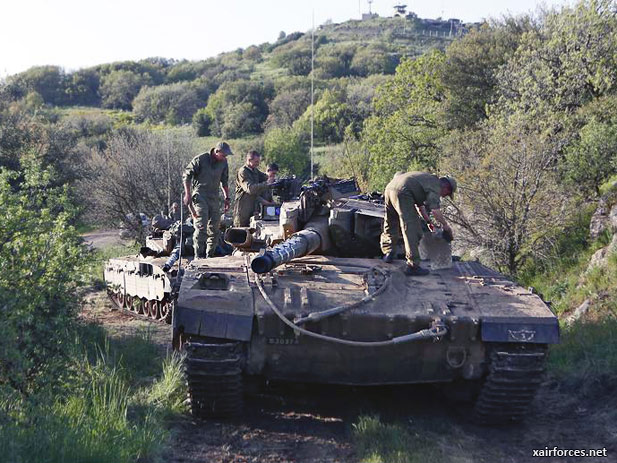
Israel hopes deal with Turkey defuses risk of friendly fire over Syria

Not only Syrian air defenses worried Israel when its warplanes bombed a suspected Hezbollah-bound arms convoy near Damascus on Jan. 30. Also probing the skies were the radars of an unfriendly NATO member close by: Turkey.
That helped persuade Israel to end its almost three-year rift with Ankara in a U.S.-brokered reconciliation on March 22.
A continued diplomatic freeze might have been tolerable, Israeli officials said, but not the possibility of inadvertently trading fire with Turkey.
Israel, Turkey and another Syrian neighbor, Jordan, have been conferring with Washington on contingency options should Damascus fall to a more than 2-year-old insurgency.
The Israeli air force has said it is poised to strike Syrian sites at short notice. It has a record of besting Syria’s Russian-supplied anti-aircraft technology, but does not want to risk tripping over Turkey, whose military is on high alert after repeated border shellings from Syria.
“If we send in the jets, and the Turks do too, a misunderstanding about who is doing what and where could be lethal,” said an Israeli official involved in the deliberations that led Prime Minister Benjamin Netanyahu to mend fences and apologize over the killing by Israel’s navy of nine Turkish activists who tried to breach its Gaza blockade in May 2010.
The Jewish state and Turkey were once close defense partners whose forces regularly carried out joint sea and aerial maneuvers.
But since 2010, the Israelis say, their air force operations over Lebanon and Syria had met with aggressive gestures from Turkey – jets scrambled as if to intercept, or radar tracking which could in theory guide missiles against the Israeli planes.
Robert Hewson, an IHS Jane’s ai-power analyst, said that for Turkey, accustomed to aerial brinkmanship against its rival Greece, “the Israelis became the new Greeks for a while.”
Should Israel plan strikes in Syria, Hewson said, it would gain a “huge advantage” in having renewed relations with Turkey.
“Israel will want to be sure it has deconflicted itself on the NATO side of the border – the Turkish side,” he said. “If they can find a common cause over the Syrian issue, they will definitely be talking again – perhaps in a quiet phone call before any mission, to say ‘this or that is about to happen.’”
Turkey has not explicitly broached military action in Syria. Its foreign minister, Ahmet Davutoglu, said on March 28 that the fence-mending with Israel “has no causal link” to Syria or Iran.
A Western official briefed on the situation around Syria said he expected that Turkey would confront Israel through public channels over any Israeli actions it deemed problematic.
After a Jan. 30 attack on a site in Syria, Turkey mocked Damascus for not firing back.
There is no suggestion the reconciliation, whose details still have to be negotiated, might lead to coordinated Turkish-Israeli strikes. But such a scenario was not always unthinkable.
Under a 2001 drill, their air forces teamed up with U.S. jets to simulate attacks on a fictitious dictatorship that was carrying out ethnic cleansing and had a chemical arsenal, according to an official Israeli military report. The three partners also practiced recovering downed pilots in war zones.
The exercise, dubbed “Anatolian Eagle” and hosted by Turkey, has been repeated since and sometimes included Jordan’s air force.
Because they are not in NATO, Israel and Jordan would not have access to the full, encrypted communications systems that allow alliance members to monitor each other’s forces during combat and thus avoid accidental exchanges of “friendly fire.”
NATO’s top commander, U.S. Admiral James Stavridis, visited Turkey and Israel this month to foster their reconciliation. He described Turkey as “NATO’s border with Syria,” where, he said, the alliance should be “prepared to undertake further missions.”
Hewson said Israel’s past training with Turkey would have given it “an insider view of the planning process for the kind of operation that might take place over Syria.”
He predicted that, should Israel launch broad attacks in Syria, it would cloak its planes in electronic defenses strong enough to ward off shoot-down attempts from the ground but not to prevent detection by other U.S.-aligned forces like Turkey’s.
Source: By Dan Williams, OCCUPIED JERUSALEM /The Daily Star: Lebanon Reuters News - 18 April 2013
Photo: Israeli soldiers stand atop a tank as they clean it close to the ceasefire line between Israel and Syria on the Israeli occupied Golan Heights April 7, 2013. Israel is worried that the Golan, which it captured from Syria in 1967, will become a springboard for attacks on Israelis by jihadi fighters, who are taking part in the armed struggle against Syrian President Bashar al-Assad. Picture taken April 7, 2013. (Photo by REUTERS/Baz Ratner)
(18.04.2013)
|